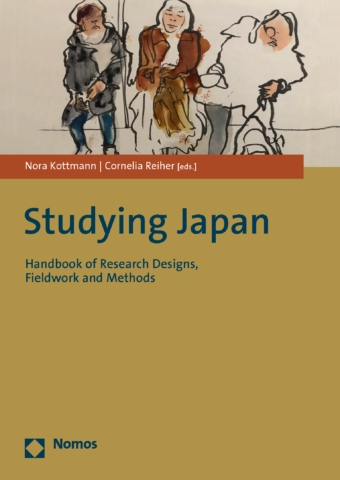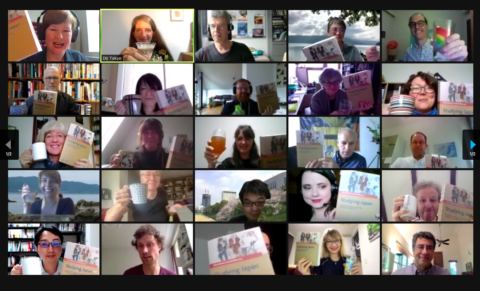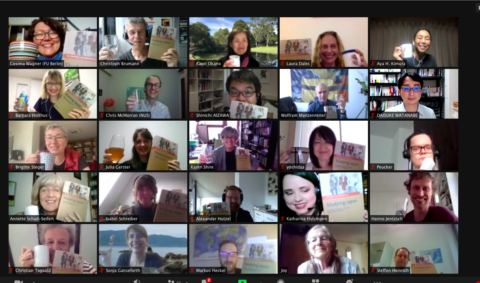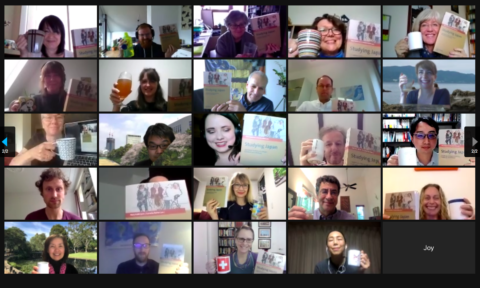Handbook Project Studying Japan: Research Designs, Fieldwork and Methods
September 2018 - December 2021
With Cornelia Reiher
Published in December 2020. The authors include DIJ researchers Isaac Gagné, Sonja Ganseforth, Markus Heckel, Barbara Holthus, and Franz Waldenberger as well as DIJ alumni Verena Blechinger-Talcott, Steffen Heinrich, Carola Hommerich, Katharina Hülsmann, Hanno Jentzsch, Susanne Klien, Annette Schad-Seifert, Kai Schulze, Gabi Vogt, Cosima Wagner, Anna Wiemann, and Urs Matthias Zachmann.
Japanese Studies is an interdisciplinary field. Research focusing on Japan’s society, politics, culture and history draws on a wide variety of theories and methods from various disciplines. This textbook responds to the increasing demand for systematic and transparent research practices in Japanese Studies and Area Studies communities. It aims to support training in research design, research methods and preparation for fieldwork in and beyond Japan. In short, it is the first comprehensive fundamental guide on methodology in Japanese Studies.
Students of Japanese Studies and researchers focusing on Japan often face the problem of choosing adequate research methods and translating them into a research design that can be meaningfully applied to Japan and its area-specific characteristics. This is especially true when conducting fieldwork on and in Japan and working with Japanese language sources. Devoid of a comprehensive textbook on methodology in Japanese Studies, students often have to start from scratch when preparing their own research for their BA, MA or doctoral theses and are confronted with questions like “How do I start my research?”, “Which methods suit which research questions and designs?”, “How should I conduct my research?”, and so forth. Lecturers who advise students or teach methodology courses are also lacking a comprehensive textbook on methodology. In order to design a methods course they have to scan through a large body of different texts on methodology and methods.
This textbook aims at making this process easier and offers a starting point for learning and teaching methods and research design in a Japanese Studies context and beyond. It compiles an overview of basic qualitative social science methods, presents doctoral students’ and senior scholars’ experiences of applying these methods to research on and in Japan, gives reading suggestions and offers exercises for self-study and hands-on activities during courses. In short, the book, which is a collaborative effort of scholars from Japan, Europe, the US and Australia, provides the foundations for a course on qualitative research methods on Japan aimed at undergraduate and graduate students as well as early career researchers in Japanese Studies, the Social Sciences and Area Studies.
Virtual book launch
In May 2021, the editors and 40 authors gathered online for the first virtual book launch with contributors of the volume. The informal get-together was also joined by Alexander Hutzel, the representative of the publisher Nomos Verlag. Around the globe, from Europe, the US, Japan, and Australia, the contributors virtually toasted the success of the publication. In breakout sessions, the contributors reconnected with colleagues they had not been able to meet for a long time. They also used the chance to share feedback and discuss first experiences when using the book.
Completed Projects
Recent Publications
Events
DIJ Method Talks
Film screening and discussion with filmmaker Thomas Ash: ‘Ushiku’
DIJ Method Talks
Measuring Sexual Orientation and Gender Identity on Surveys in Japan: Methods and Epistemologies
DIJ Method Talks
Worshipping the Kami at a Distance: World-Wide Shinto and the Global Pandemic
DIJ Method Talks
Mental mapping: Rediscovering and reframing a geographical method for mobility patterns
Symposia and Conferences
Studying Japan: The impact of transnationalization and technological innovation on methods, fieldwork and research ethics
Team
 Nora Kottmann (until October 2023)
Nora Kottmann (until October 2023)Head of research group 'Methods and Methodologies'



